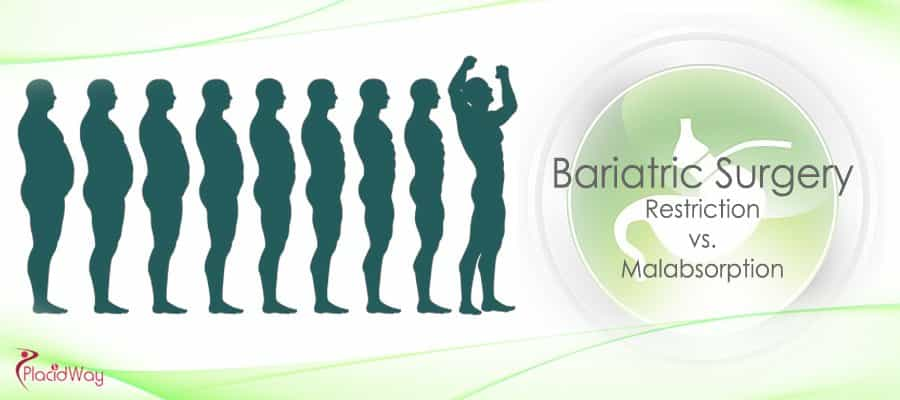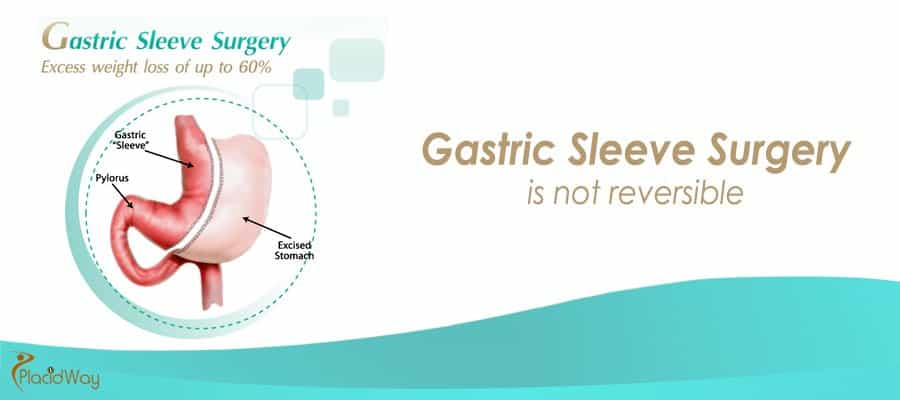
Bariatric Surgery: Restriction vs. Malabsorption
Weight loss programs, drug therapy and diets have not shown long-term effectiveness in treating morbid obesity. Therefore, bariatric surgical procedures are the most effective obesity treatments and they work either by restricting a patient’s ability to eat (Restrictive Procedures) or by interfering with ingested nutrient absorption (Malabsorptive Procedures).
All commonly performed bariatric surgery procedures can either be classified as restrictive, malabsorptive or a combination of both. While the combination of restriction and malabsorption has the potential for greater overall weight loss, it is also more complex and comes with higher dietary restrictions.
Most bariatric procedures can be performed open or laparoscopically (using minimally invasive techniques), but laparoscopic surgery is usually a much better option because it results in shorter hospital stays, lower infection rates and smaller scars.
Restriction, malabsorption or both?
Purely restrictive procedures such as the Lap Band Surgery and the Sleeve Gastrectomy simply reduce the volume of the stomach such that a patient will ultimately lose weight by eating less than before and feeling fuller sooner.
Malabsorptive surgeries rearrange and/or partially remove the patient’s digestive system which then limits the amount of calories and nutrients that the body can absorb. Treatments with a large malabsorptive component result in the most weight loss but tend to have higher complication rates, which is why there are no longer any purely malabsorptive operations being performed.
Procedures such as Gastric Bypass or Duodenal Switch, which combine restriction with malabsorption, have a second, restrictive component. Part of the small intestine is bypassed or rerouted, reducing the surface area of the small intestine and in turn allowing fewer calories to enter the bloodstream.
Widely accepted types of restrictive procedures
The established types of bariatric procedures are Gastric Bypass Surgery (Roux-en-Y), Adjustable Gastric Banding (Lap Band Surgery), Gastric Sleeve Surgery (Vertical Sleeve Gastrectomy), Biliopancreatic Diversion with Duodenal Switch (Duodenal Switch or BPD/DS), Gastric Bypass Revision Surgeries (include Sclerotherapy, the ROSE and StomaphyX procedures, addition of gastric band, lengthening of Roux limb and conversion to Duodenal Switch).
Adjustable Gastric Banding (Lap Band Surgery) involves an inflatable band that is placed around the upper portion of the stomach. It has been used in Europe since the 90’s and it wasn’t approved by the FDA in the States until 2001.
Lap Band Surgery is a better option for some people as it has a lower risk of serious complications. It is the only established procedure that is completely reversible, but unfortunately it has a very high variability in weight loss from patient to patient, and is associated with more minor complications. Most concerningly, it is more likely to require reoperation over the long-term as a result of permanent failure.

Gastric Sleeve Surgery is the newest of the available procedures, and is less complicated than Gastric Bypass or Duodenal Switch, leading to similar weight loss. Although it is not reversible or easily adjustable like the Lap Band, it carries a much higher weight loss and much lower risk of reoperation.
The Sleeve Gastrectomy is performed by removing approximately 80 % of the stomach, with the remaining stomach resembling a tubular pouch. The procedure which requires no foreign objects, no bypass or re-routing of the food stream causes favorable changes in gut hormones that suppress hunger and reduce appetite.
Widely accepted types of malabsorptive procedures
Gastric Bypass, also called Roux-en-Y or RNY, is the most commonly performed bariatric surgery in the United States and is mainly restrictive in nature, but it also has elements of malabsorption. Roux-en-Y Gastric Bypass has a relatively low complication rate, and its popularity also means that there are more surgeons out there who could improve your chances for a good outcome.
Most patients have successful long term weight loss, but over time some patients' stomach pouch or stoma (the opening between the stomach and small intestines) can stretch causing significant weight regain. In these cases, Gastric Bypass Revision Surgery may be appropriate.
Duodenal Switch is probably the most effective procedure for the super-obese. Combining both restrictive and malabsorptive techniques, it has been proven to be successful for about 85% of patients after three years. It may also be the most effective procedure for treating obesity-related health problems. For example, in one study Duodenal Switch Surgery cured 100% of diabetic patients (Alverdy and Prachand, University of Chicago).
The amount of weight loss long-term also appears to be better than other procedures, but it has the highest rate of serious complications and the most intensive bariatric vitamin adherence requirements due to the level of malabsorption.
Outdated types of bariatric surgery
The generally rejected types of bariatric surgery are Vertical Banded Gastroplasty (“Stomach Stapling” or VBG) and Mini Gastric Bypass Surgery (MGBP).
Vertical Banded Gastroplasty has been almost entirely replaced by newer and more effective procedures, but it may be an option in certain circumstances. Its weight loss results are more consistent than Lap Band Surgery, and unlike the Gastric Bypass and Duodenal Switch Procedures, it does not rearrange the digestive system. However, it may not be the best bariatric surgery option for a number of reasons: lower excess weight lost over the long term, longer length of stay in the hospital, higher complication rates, more restricted diet following recovery.
Mini Gastric Bypass Surgery is a simplified form of Roux-en-Y Gastric Bypass. The procedure is shorter, easier, less expensive, and has lower risk and equally successful outcomes as RNY, but there are a few signifigant reasons why this might not be the best choice: it usually bypasses much more of the intestine than a standard Gastric Bypass which could lead to more vitamin and mineral deficiencies; digestive enzymes and bile are not diverted away from the stomach, which can lead to bile reflux gastritis, increasing the risk of cancer in the stomach pouch; experienced surgeons are less likely to offer Mini Gastric Bypass than Gastric Bypass.

Generally speaking, the bariatric procedures that result in more weight loss are often accompanied by higher risk and additional lifestyle changes.
Surgical complications from all of these procedures may result in more severe forms of malnutrition. Deficiencies in vitamins and other nutrients appear to be more substantial following malabsorptive procedures, but occur with restrictive procedures as well, and may become clinically significant if not recognized and treated with supplementation.
Medical tourism makes quality and affordable bariatric surgery available to anyone. Traveling abroad for medical care can be a pleasant and benefic experience, as long as the patient does a thorough research when choosing a certain country, clinic or surgeon.
PlacidWay is a world leader in medical tourism, offering clients affordable and high quality solutions for all of their specific needs. Our top priority is the safety and quality of services provided to our patients. Through its extensive network of international medical facilities, PlacidWay helps patients get access to the best procedures performed by certified medical professionals, and can help you through the process of choosing a foreign medical institution.
If you need more information about bariatric surgery, do not hesitate to contact us!











